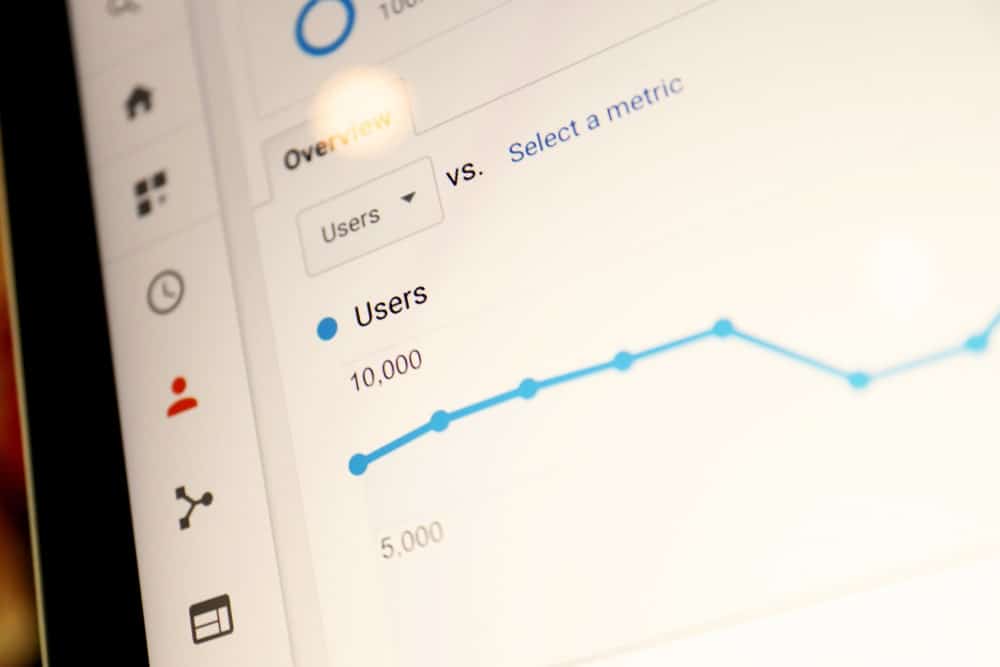Quickly Diagnose Drops in Google Rankings
You’ve noticed your site experienced a significant drop in Google rankings. Was it something you did? Are your pages displaying correctly? Is it a specific page or the entire website? Is the loss confined to new users or return visitors?
Everyone immediately jumps to the conclusion that they’ve been stymied by a Google algorithm update. But, the truth is that this is actually one of the rarest reasons that publishers see a decline in organic traffic.
In a recent Ezoic Explain episode, Tyler also goes through the process of evaluating the loss of organic traffic due to a loss of Google rankings. He takes us through this process in Google Analytics step-by-step. Watch the video below, or check out my summary underneath.
In the video, Tyler walks you through a variety of ways to troubleshoot your website and determine why your Google rankings may have decreased by examining the following:
- landing pages
- location
- device
- new vs. returning visitors
- Search Console data
Here’s what reports Tyler draws to form various conclusions about where a loss in traffic or Google rankings could be originating.
Segmenting Organic Traffic Visitors
In this example, we will be looking at Google Analytics for a site called kididdles.com, a website for lyrics to children’s songs.
Next, navigate to the Audience/Overview tab.

We’ll need to set the Segment at the top of the page to include only “organic traffic”. Then, we’ll want to set and to a specific date range. Preferably, we’ll set the date to right after we notice a loss in traffic and can then select the box for “previous period” to automatically compare that to traffic previously.
NOTE: If after segmenting traffic and comparing date ranges you notice it is not organic traffic that has been affected, you may want to explore this guid on evaluating other forms of drops in traffic.

Scroll down within the Segment Name list to uncheck All Users. Next, scroll down to checkmark Organic Traffic and hit apply. Now, any data we look at within Google Analytics will only be in reference to organic traffic.

As we can see, 89% of users visiting the website come through organically.

To gain a better understanding of how the site usually performs, we want to compare this time period to the previous time period: within the date range dropdown, checkmark Compare to Previous period.
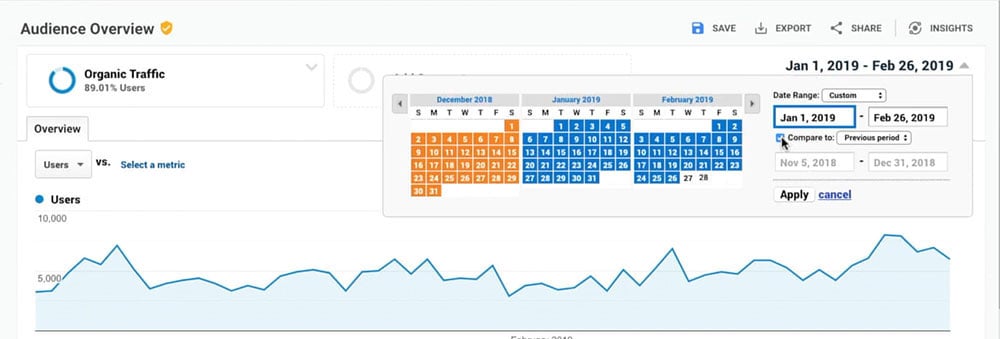
As we can see, organic traffic has decreased by nearly 33% since the previous period. Now, let’s begin digging deeper into why.
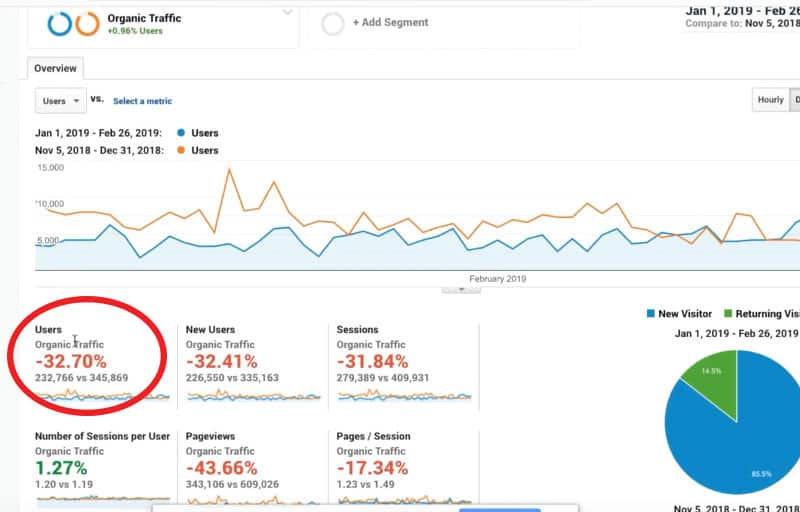
Did I Lose Google Rankings On One Page or Many Pages?
We’ll start in the Behavior tab; select Site Content in the submenu, and then click Landing Pages. By examining landing pages, we can begin to see which pages are driving the decline in organic traffic.
Some reasons your site may have organic traffic loss:
- One of your pages is no longer top-ranking
- A page has been de-indexed
- One of the pages is being redirected (shows up as 404 error)
- Multiple pages have a seemingly similar problem, such as from a previous fix or improvement to the pages
The top landing page’s traffic is fine in this example and hasn’t seen a significant decrease, so the drop is not a result of our most popular page. As we scroll down, we can see some pages are gaining traffic while others are losing traffic.
NOTE: If you have a big drop on one of those pages, go to that page. Make sure there isn’t something inherently wrong with it (blank/404). Then, right click and select “view source”. Go Edit in your browser and select Find. No type in the word “index”. You should be show to a portion of the page that allows you to see the index status of the page. If you see “no-index”. Congratulations. This is the problem. It is often the result of a plugin or htaccess file gone wrong.
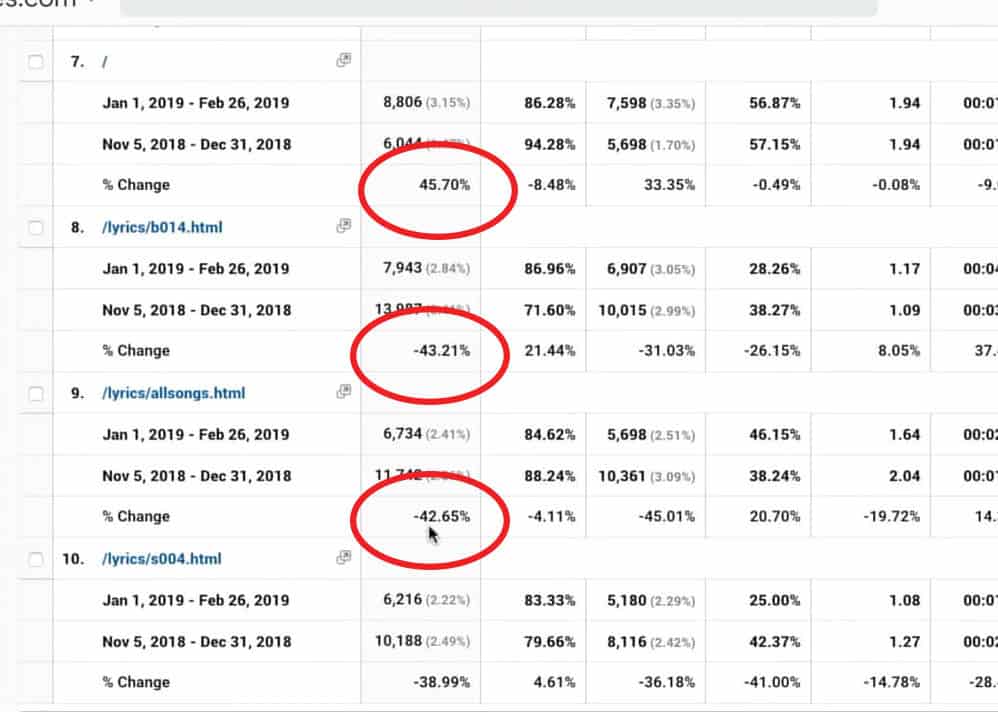
As no particular page is showing a heavy loss in traffic, we can rule out a singular page causing the drop on this website.
Did My Website See A Drop In Rankings Globally?
Since the results of the Pages tab were inconclusive, we will next look to see if the traffic loss is confined to a region or country.
Return to the Audience tab, select the Geo submenu, and click Location.

A loss in traffic in a specific location can be a result of something like being a multi-language site, blocks, and security warnings.
If a particular region or language is showing a drop in traffic, consider what may be affecting that group: did a change you made to your website hinder or prevent users in that area from visiting your website? Have regulations within that region have changed so they can’t see specific types of websites or information.
Is HREF-lang properly configured on your site? If you do have multiple languages, are you accidentally showing the wrong one?
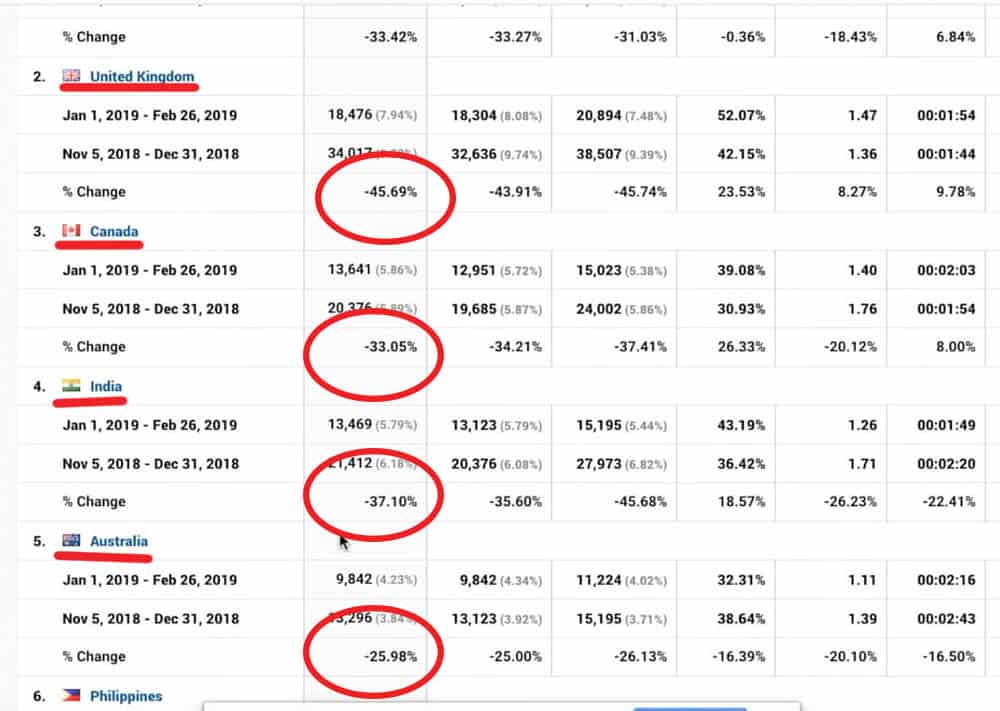
No specific region or language is the cause of a traffic drop for kididdles.com, so we will consider other factors.
Did You Only Lose Google Rankings On Mobile?
Next, we will look at the Mobile tab.
By selecting Mobile and then Overview, we can determine if this drop is happening on all devices or if it is just a particular device. Many times, publishers will make and view changes to their website on the desktop version of their site but don’t check to see how those changes affect their mobile site.
Singular device issues can be a result of changes you have made to your website, such as fixing site speed and deferring CSS: while your desktop version may load fine, the mobile page might show as a white screen.
When making changes to your website, it is important to always check how it looks on all devices.
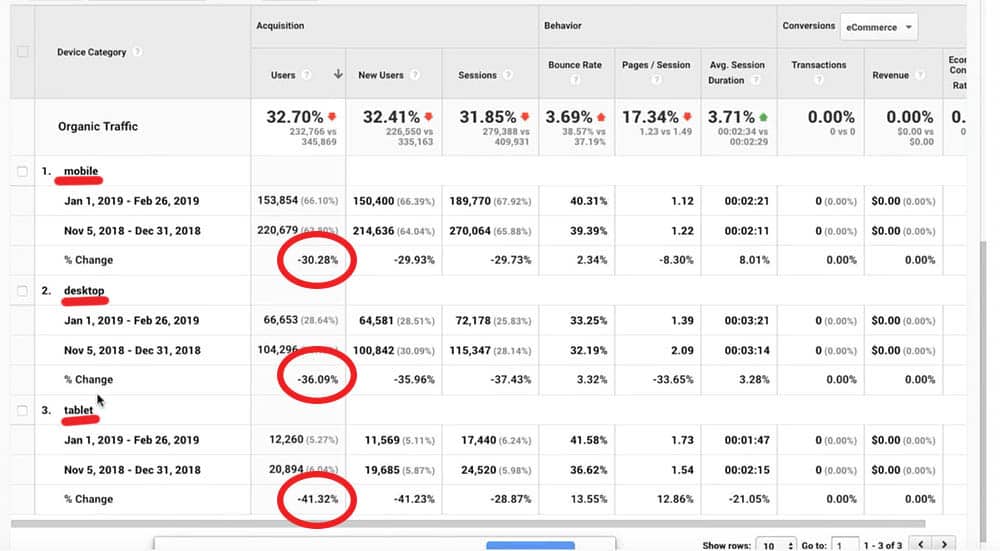
In this instance, all of the drops in organic traffic are pretty equal, and mobile is actually the best-performing device.
Is The Drop On New Or Returning Organic Visitors?
Another set of data to look at is New vs. Returning visitors under the Behavior tab. Here, we want to see if the decrease in organic traffic is people who have been to your site before and are aware of what they are looking for or if it’s just new visitors.
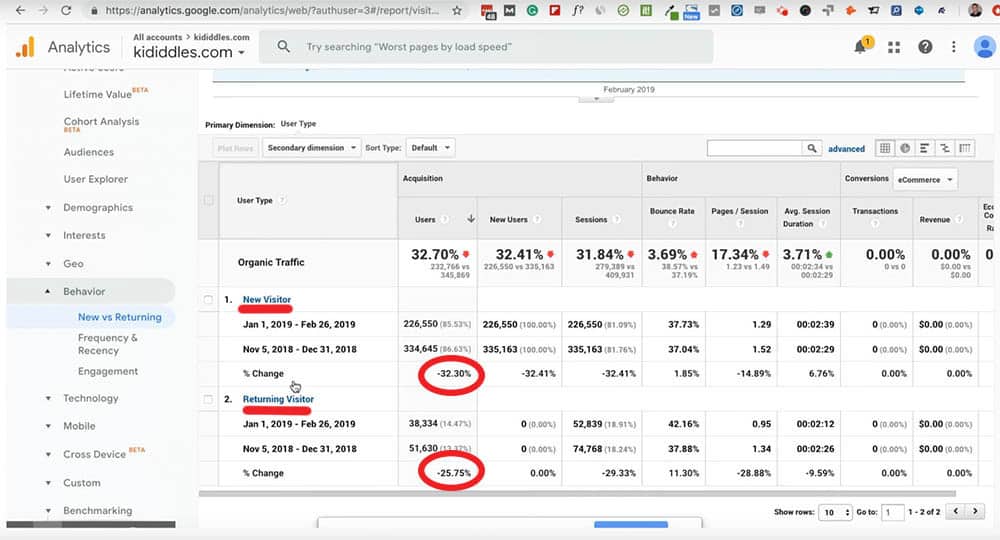
We can see here that the drop is not confined to either group of visitors, so all users are being affected in the same way.
NOTE: If it is just one of these segments being affected, it may be related to a specific keyword or type of content on your site that has been the most affected. This could be the result of an algorithm change or changes you’ve made to category URLs or internal site linking to similar pages.
Is The Drop Confined To A Specific Keyword?
The last item we will check is our keywords. To view these, navigate to the Acquisition tab and then the submenu Search Console, where we can see Queries.

In order to use the Search Console tab, you will need to link your Google Search Console to Google Analytics. If you have not yet done so, click one of the tabs under Search Console and it should prompt you to do so. The advantage of having Google Search Console and Google Analytics linked is that it allows you to see query information, which will show you exactly what keywords are driving the loss.
Once your Google Search Console and Google Analytics are linked, you will need to turn off the audience segmentation for only organic traffic that we implemented earlier. Return to the scrolling menu of segmentation options and reselect All Users.
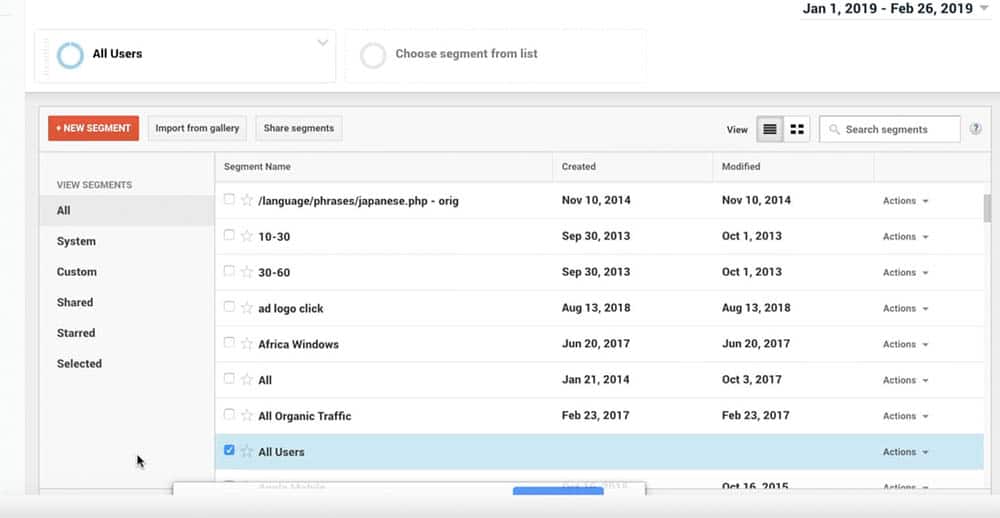
Now, we can see a list of keywords that users have actually searched before they have clicked on the site, and if there has been any change between the two date ranges.
Here, we can see that a number of different keywords are driving the loss: ’I’m a little teapot’ is down by 20%, ‘miss mary mack’ is down by 41%, and’ this little light of mine’ is down by nearly 48%.



Now that we know what keywords are driving significant decline, if we select Landing Pages under the Search Console tab, we can see the actual pages associated with those keywords.
For example: By examining the ‘I’m a Little Teapot’ (/lyrics/h012.html) page, we can see if there is anything we can do to augment the page and change those keywords.
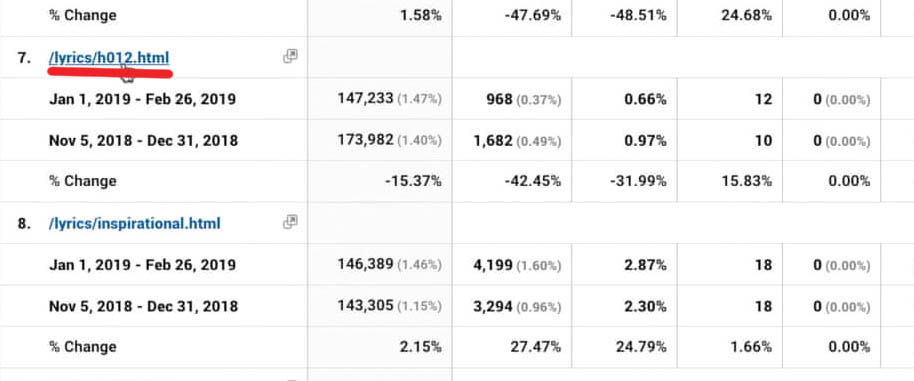
As an additional step, we can actually take the exact query out of the Search Console and Google it to see if we can learn anything about why traffic has decreased.
As we can see, Google Knowledge Graph is now showing the lyrics right inside of the search page as opposed to people coming to kididdles.com for the lyrics. The significant drop in traffic is a result of the information.
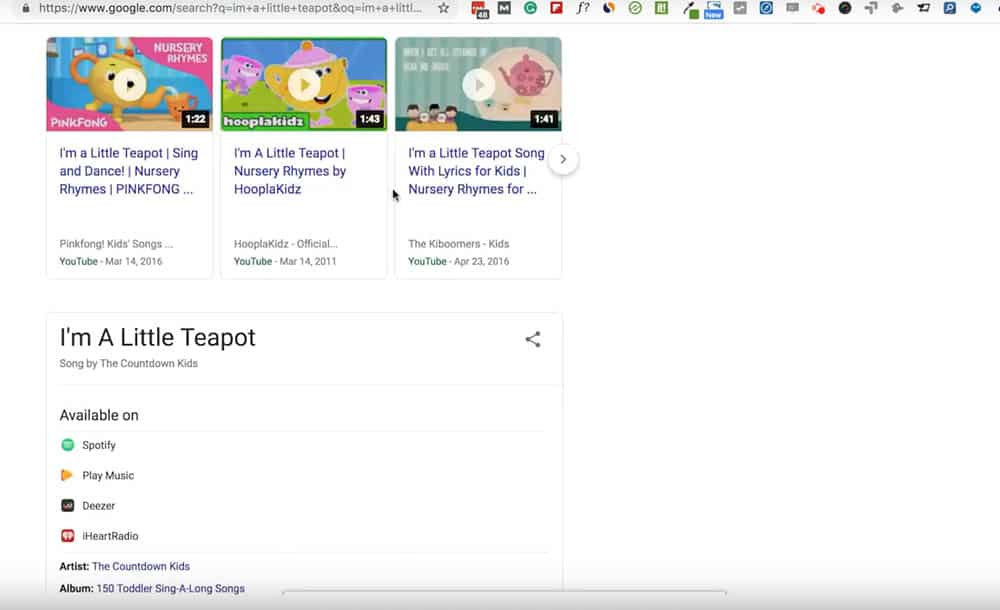
Intelligently Investigate Your Website & Audit Your SEO
While a drop in ranking and organic traffic can be a result of many factors, knowing how to intelligently review the data available on your website’s performance should lead you to why.
If you are able to pinpoint exactly where and why you are losing traffic, it becomes easy to work backward on what you can do to fix or improve.

Still, don’t know why you’ve lost organic traffic?
If you’ve been through all the steps above and still are at a loss, try a deeper SEO audit (use this link to self-perform it).
With all of these tips together, you should be able to better explore your site, determine why there may be a drop in organic traffic from Google searches, and stay ahead of it in the future.
If not, leave your comments below. Tyler will read them and try to offer some more things to explore.
